While we now know, in general, what to expect from award ceremonies in a pandemic, no one can ever predict who or what will make the headlines once the night is over.
The Oscars has a long and great tradition of causing a media storm, so here are some its most memorable moments.
1940: First black Oscar winner segregated from rest of cast
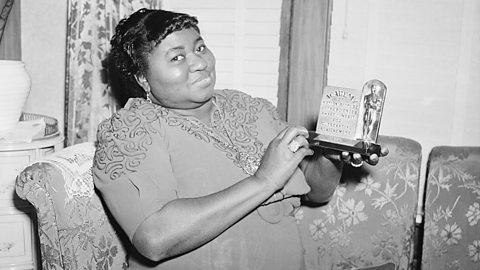
Hattie McDanielвҖҷs performance in Gone With The Wind landed her a well-deserved Academy Award for Best Supporting Actress, making her the first black person to ever win an Oscar. However, rather than being seated at the table with the rest of her co-stars, she was forced to sit on a table at the back of the room in the Ambassador Hotel in Las Vegas, as it had a strict segregation policy.
Hattie didnвҖҷt appear to let this ruin her win though - in her very moving acceptance speech, she was overcome with joy and finished it by saying: вҖңmy heart is too full to tell you just how I feel. And may i say thank you, and god bless you.вҖқ
Tragically, despite her being an Oscar-winning actress, her final wish to be buried in Hollywood Cemetery was denied, as that still had a segregation policy at the time of her death.
1958: Donald DuckвҖҷs not-so-quacking co-hosting
Forget the Tupac hologram at Coachella: 1958 saw an animated film of Donald Duck (yes, you read that right) co-host the Oscars. He appeared beside and interacted with his fellow hosts Bob Hope, Jack Lemmon, David Niven, Rosalind Russell and James Stewart.
Unfortunately, he hasnвҖҷt reached the Oscars hall of fame. In fact, poor Donald is often voted one of the worst hosts of all time. Hopefully the criticism was like water off a duckвҖҷs back.
1973: Marlon BrandoвҖҷs extremely dramatic award refusal
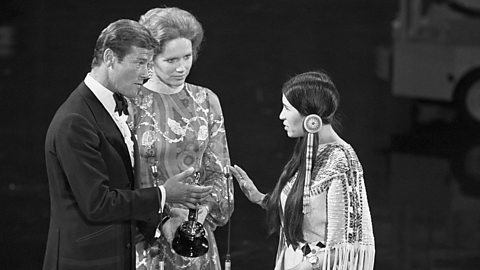
Marlon Brando is considered by some to be one of the greatest actors of all time and an Oscar win for his performance as Vito Corleone in The Godfather came as no surprise. What did come as a surprise though, was his boycott of the ceremony and his refusal of the accolade.
He sent a Native American activist called Sacheen Littlefeather in his stead, to tell the Academy that he would not be accepting the award. She cited вҖңthe treatment of American Indians today by the film industry and on television and movie re-runsвҖқ as his reason. In the full speech released to the press Brando stated: вҖңThe motion picture community has been as responsible as any for degrading the Indian and making a mockery of his character, describing his as savage, hostile and evil.вҖқ
He wasnвҖҷt the first person to turn down the Best Actor award - George C. Scott declined it in 1971 for his performance in Patton.
1974: A different kind of protest on the Oscars stage
Actors tend to bare their souls on screen, but one person decided to take that quite literally at the 46th Academy Awards and run completely bare naked across the stage.
Host and actor David Niven was in the middle of introducing Elizabeth Taylor to present the award for Best Picture, when art gallery owner Robert Opel ran across the stage in nothing but his birthday suit. Niven was quick off the mark and responded: "Isn't it fascinating to think that probably the only laugh that man will ever get in his life is by stripping off and showing his shortcomings?"
The controversy didnвҖҷt end there: people later speculated that the entire thing was staged, as was David NivenвҖҷs quick quip. Either way, Elizabeth Taylor was right in saying when she eventually did get on stage: вҖңthatвҖҷs a pretty hard act to followвҖқ.
1993: A ban for lifeвҖҰ or at least a few years
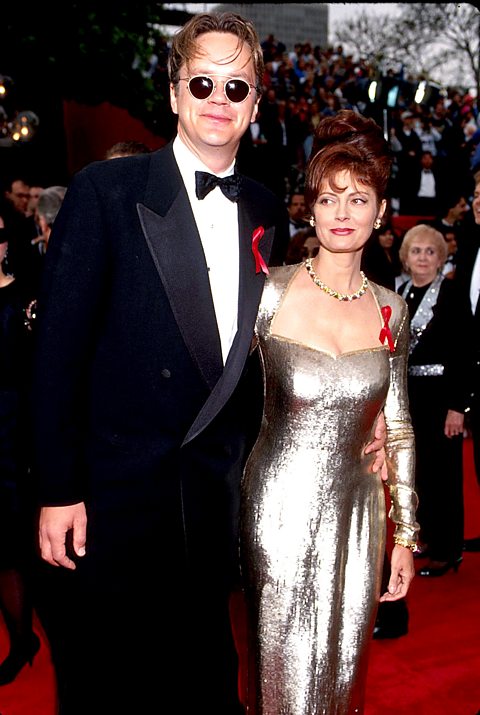
The Oscars stage is no stranger to political speeches, but one year in particular the Academy seemed to tire of them - so much so, that the people delivering them were threatened with a ban for life.
Richard Gere, Susan Sarandon and Tim Robbins all spoke passionately about different issues: Richard Gere condemned ChinaвҖҷs invasion of Tibet, and Susan Sarandon and Tim Robbins made a speech about how HIV-positive Haitians were treated. The producer of the awards that year, the late Gil Gates, was so furious that he said the three of them were never allowed to return.
ExceptвҖҰ they were. Ms Sarandon won Best Actress just three years later, and Tim Robbins won Best Supporting Actor in 2004. Richard Gere has yet to reappear though, so maybe they were serious about him.

2001: Björk makes an egg-cellent red carpet appearance
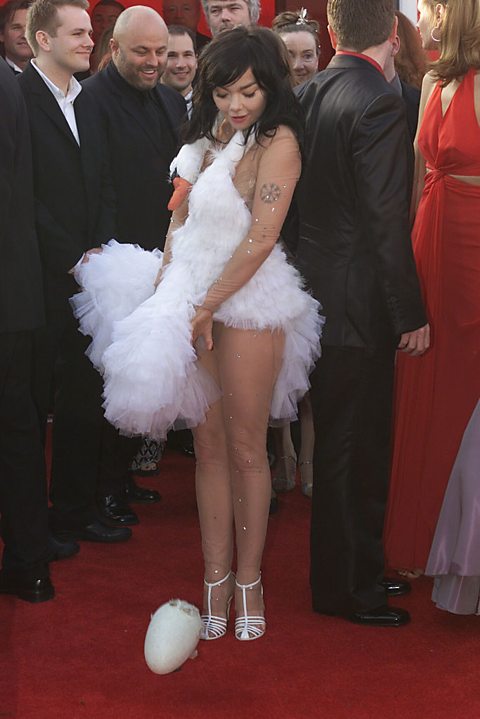
Making statements on red carpets is all the rage nowadays (remember Lady GagaвҖҷs meat dress?) but the person who arguably started the trend is none other than Icelandic star BjГ¶rk.
Her incredible Marjan Pejoski dress was made to look like a swan, however the real showstopper came when she вҖҳlaidвҖҷ not one, but SIX eggs on the red carpet.
Hilariously, she later said in an interview: вҖңother peopleвҖҷs bodyguards kept picking them up and saying in their thick American accents, вҖҳвҖҷScuse me, maвҖҷam, you dropped this.'вҖқ

2012: Sacha Baron Cohen brings Kim Jong-Il as his plus one
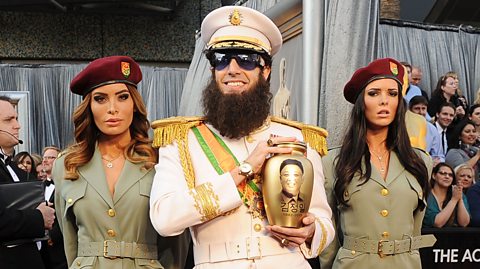
Sacha Baron Cohen might be best known for his characters Ali G and Borat, but The Dictator Admiral Aladeen made the most noise on the OscarsвҖҷ red carpet.
Whilst being interviewed by Ryan Seacrest, he started off fairly innocently (for him), suggesting Sadam Hussain had advised him never to spend too much money on socks.
He then introduced the jar he was holding, which he said contained the ashes of Kim Jong-Il, claiming it was the late North Korean leaderвҖҷs biggest wish to attend the Oscars. He then, in a comedy of errors (or very purposefully) tipped the ashes onto Mr Seacrest, and proclaimed вҖңnow when people ask you what youвҖҷre wearing, you can say Kim Jong-IlвҖқ. Luckily his special style of diplomacy didnвҖҷt manage to cause a new World War.
2016: #OscarsSoWhite
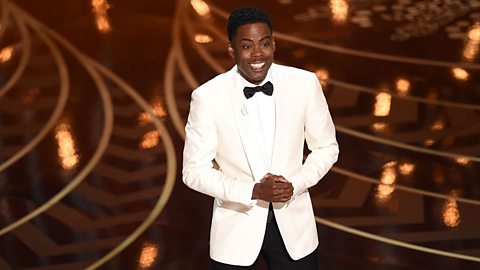
In 2015, the world was outraged at the lack of a single nomination for a black actor in the four acting award categories. This kick-started the #OscarsSoWhite movement and, in 2016, it managed to repeat itself.
Parts of the industry were apoplectic. Will and Jada Smith, along with director Spike Lee and others boycotted the 2016 ceremony altogether, whilst others made emphatic rants against the Academy on social media.
Whilst the chair of the Academy did apologise at the time, it wasnвҖҷt enough for some people. Chris Rock, who hosted the awards that year, gave voice to a lot of peopleвҖҷs frustrations in a poignant 10-minute-long speech.
He addressed the elephant in the room head on by joking, вҖңyou do realise, if they nominated host, I wouldnвҖҷt even get this jobвҖқ. But perhaps the most pointed part of the speech was when he outright called Hollywood racist, and said, вҖңwe want opportunityвҖҰ thatвҖҷs itвҖқ, imploring the industry to give more roles to black actors.
2017: La La Land! No wait, sorryвҖҰ Moonlight!
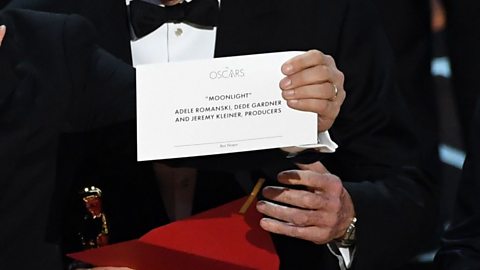
It was the stuff of nightmares. Best Picture, the most coveted awards at the Oscars, was about to be announced. Presenter Warren Beatty spent ages reading the card and looking confused, before co-presenter Faye Dunaway snatched it out of his hand and declared La La Land as the winner.
And we all know what happened next. The cast and crew of La La Land all piled on stage, before their producer Jordan Horowitz grabbed the mic to announce that Moonlight had actually won. He had to insist he wasnвҖҷt joking several times.
What had happened was Warren Beatty had mistakenly been given the card for Best Actress, which was for Emma Stone in La La Land, hence his hesitation. This will definitely go down in Oscars history as the gaff to end all gaffs.
This article was published in February 2019 and last updated in 2021
Eight blockbuster films that got history wrong
Some of these are Oscar winners too, but they're not getting any prizes for knowing their history.
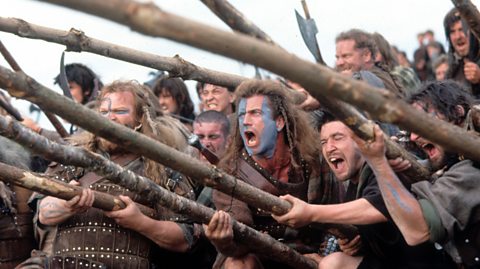
GCSE Drama
If you want to win a BAFTA one day, brush up on your GCSE drama here.

The Civil Rights Movement in America
Learn all about the movement that paved the way for the end of segregation in the US.
